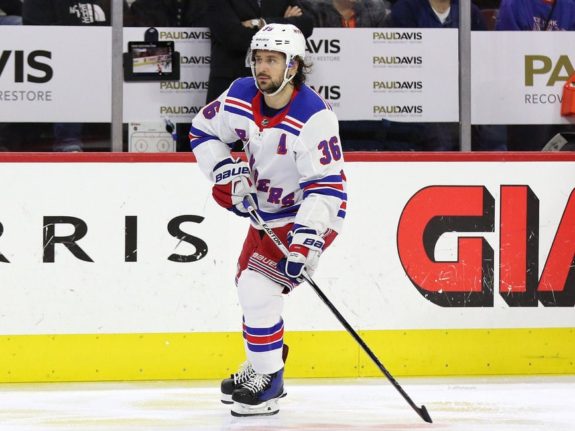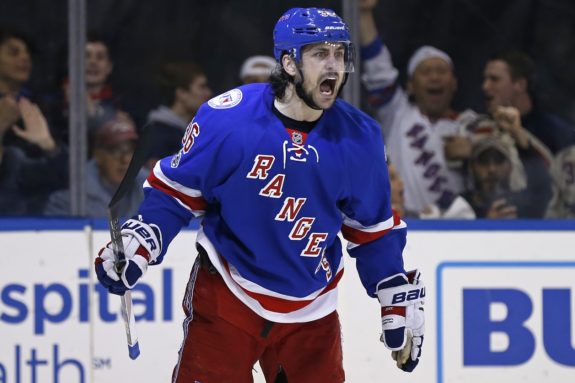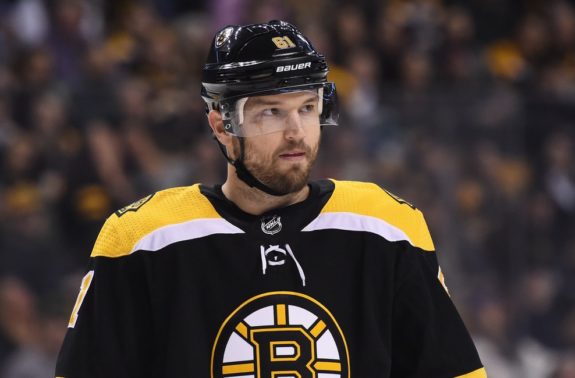Plenty of fans were surprised when the New York Rangers’ pre-trade deadline selloff in February didn’t include forward Mats Zuccarello.
Following management’s stated desire to trade off assets and rebuild the club, speculation swirled about how many suitors there would be for the diminutive but offensively talented Norwegian before the deadline. Invaluable to the Rangers during their years of Stanley Cup contention, he seemed a perfect trade target for a contender who craved the scoring and energy Zuccarello provides.
The question wasn’t if he would be traded but when and for what? The discussion focused on what he was worth: a second-round pick and a prospect, or a first-rounder? Then the deadline passed and the beloved Zucc kept his Blueshirt, unlike so many of his veteran teammates who were shipped off in deals for future assets.
Though it might have stunned some, the reality was that Zuccarello was more likely to remain a Ranger than depart; the reason being that his contract and a down season could have scared off potential trade partners.
The eight-year veteran wasn’t a rental player, with one season remaining on the four-year deal he signed in March 2015. At an annual average value of $4.5 million, Zucc’s contract was considered below market value when he inked it in lieu of testing free agency, wanting to stay with the club he helped reach the Stanley Cup Final in 2013-14 and that would go on to capture the Presidents’ Trophy and make it to Game 7 of the Eastern Conference Final in 2014-15.

Any team acquiring Zuccarello would have received two potential playoff runs at a reasonable rate, a major selling point. Even with the workable AAV, though, it’s possible that no team wanted to commit to that $4.5 million cap hit next season, especially when Zuccarello’s play didn’t measure up to his usual standards.
Zuccarello’s Production, Intensity Dropped in 2017-18
Whether it was the mood that hung over the team due to the Rangers’ stated mission to rebuild, their general ineptitude on the ice later in the season or a combination of the two, Zuccarello simply wasn’t as good offensively. Though he did record 16 goals and 37 assists, the excellent passing and timely scoring seemed absent too often, and he wasn’t the same force on the power play.
Zuccarello, who had scored 12 power-play goals over the previous two seasons, often operating from his trademark spot low on the right side, managed one in 2017-18. He recorded 17 points with the man advantage but the low number of power-play goals likely hurt his value in trade talks.
More importantly, his energy, intensity and often extremely irritating presence against opponents appeared to be missing far too often. Driving bigger players crazy and then scoring or setting up goals against them has been Zuccarello’s ticket to success since he arrived in the NHL in 2010-11 and he slowly but steadily developed into an unlikely star. A plus-55 over the previous five seasons, Zucc was a minus-10 in 2017-18.
Now many are demanding that he be traded this offseason, perhaps at the draft. The idea is to leverage every important veteran asset as part of the Rangers’ rebuild. Doing so, however, could end up being a rash decision and, ultimately, a mistake. If a deal arrives that’s to the Rangers’ liking they should, by all means, pull the trigger but the right call could be not to rush it and carry him into next season.

There’s risk in keeping Zuccarello and hoping he rebounds with a strong effort that rebuilds his value. Could he be declining, given that his point totals have dropped in each of the past two seasons? If that proves to be the case and he stays with the team into next season, the Rangers might end up having to settle for even less in return at the deadline than they might have gotten for him during 2017-18 or this offseason.
Betting on a bounce-back season, however, might be the better move. If he can return to form under new coach David Quinn, he’ll be an even more attractive rental trade chip with his contract set to expire and no financial commitment beyond 2018-19.
The Rangers have executed their teardown strategy about as well as could be hoped for but there’s no reason to rush into turning every tradeable veteran player into draft picks just because a rebuild is underway. The mission is to build for the long-term; as such, every bit of future value that can be squeezed from the current roster doesn’t need to arrive immediately.
If the Blueshirts did, in fact, receive offers for Zuccarello before the deadline and refused to jump at one because they didn’t care for the terms, good for them.
Rangers Need to be Patient in Trading Zucc
If that was the case, they should continue to exercise the same restraint this offseason. They shouldn’t get caught up in the potential flurry of deals at the draft next month and move him just to move him; they need to be willing to play the long game for his value. Players believed to be the missing piece to a Stanley Cup run are highly coveted just before the trade deadline, more so than during the offseason.
The potential for a rebound in Zuccarello’s value is realistic. Rick Nash went on a pre-deadline surge this season, scoring nine goals in 16 games immediately before being traded to the Boston Bruins on Feb. 25. The Rangers received a haul that included a 2018 first-round pick, defense prospect Ryan Lindgren, forward Ryan Spooner and a 2019 seventh-rounder for a player that’s clearly past his prime. Nash’s timely scoring binge had plenty to do with the high-value return, not to mention the level of interest.

It’s doubtful that Zuccarello would be as sought after as Nash was but, who knows? If Michael Grabner was worth a second-round pick and a defensive prospect from the New Jersey Devils, the Blueshirts should be looking for at least a first-rounder in return.
Maximizing his trade value – and that’s what he represents at this point to a club that’s getting younger – might require rolling the dice on a player who meant so much to them when they were chasing the Cup not that long ago, and holding off on dealing him for while. If that strategy proves successful, and Zuccarello has a resurgent season that sets the Rangers up to move a coveted player to a contender next year, then discussions about a high return for him could end up becoming reality in 2019.